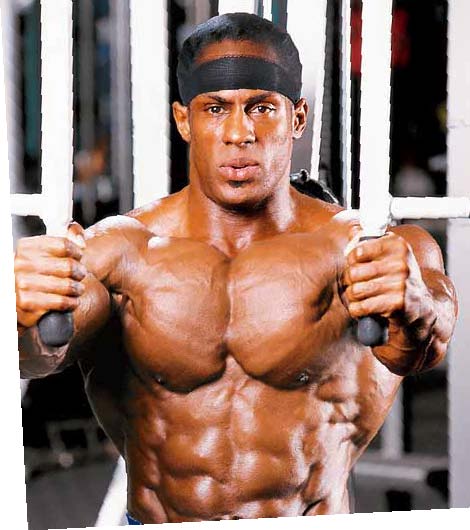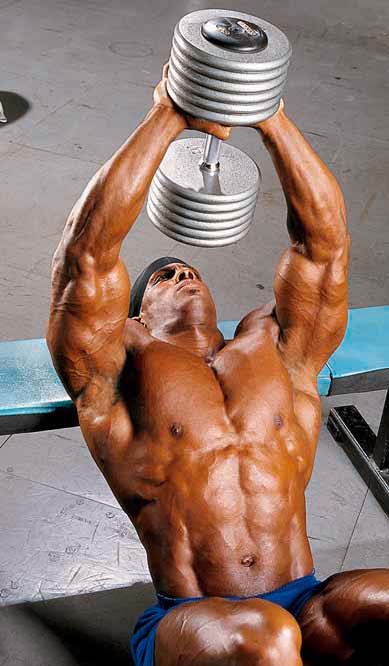|
CHEST |
ADVANCED
ROUTINE: OMAR DECKARD
|
|
CALIFORNIA’S OMAR DECKARD
knows size. Competing at a massive 260
pounds, the super heavyweight built his foundation by
training like a powerlifter. Now his routine reflects a mix
of those strength-lifting concepts and the higher-rep sets
needed to bring about a muscle pump.
>>
“Your first exercise is the most important one in your
workout because that’s when you’ll be able to push yourself
the hardest,” Omar says. “Choose mass movements like the
bench press to start.”
>>
To build your pecs, a squeeze at the apex of every rep is
vital.
|
|
#5 |
|
EXERCISE |
SETS
|
REPS
|
Flat-Bench Barbell
Press* |
3
2
|
warm-up
10, 6 |
|
Incline DB Press |
4 |
12–15 |
|
Pec-Deck Flye |
3 |
10–15 |
|
DB Pullover |
3 |
6–8 |
|
|
|
 |
|
INCLINE DUMBBELL
PRESS
START: Lie
squarely on the incline bench, which should be set
at a fairly low angle. Hold the dumbbells just
outside your shoulders.
MOVE:
Forcefully press the weights up in an arc until your
arms are fully extended above your chest. Reverse
the motion, being sure not to overstretch your
shoulders by lowering the weights below chest level.
|
|
 |
 |
|
PEC-DECK FLYE
START: This version
of the pec-deck flye machine has handles instead of
elbow pads. (Both versions of the pec deck are
effective, acceptable choices.) Adjust the seat so
that your shoulders, elbows and hands are on the
same horizontal plane after you grab the handles.
MOVE:
With your back squarely against the pad, forcefully
bring the handles all the way together, making sure
to keep your elbows up to make the movement more
efficient and to reduce the risk of injury.
Reversing the motion, allow the handles to go back
to a point at which you feel a strong stretch in
your pecs before beginning your next rep.
|
|
 |
 |
 |
|
DUMBBELL PULLOVER
START: Lying
across a flat bench, keep your glutes low, which
affords you a greater stretch.
MOVE:
Holding the inside edge of a dumbbell at arm’s
length overhead, allow the weight to go behind you,
keeping your arms straight, stretching your pecs and
lats but keeping your hips down. Reversing
direction, pull the weight back up, breathing out
only after reaching the uppermost position to ensure
that your core is stable throughout the movement.
|
|
| |
Source:
One
of the
magazines of MUSCLE
& FITNESS
|
| |
|
|